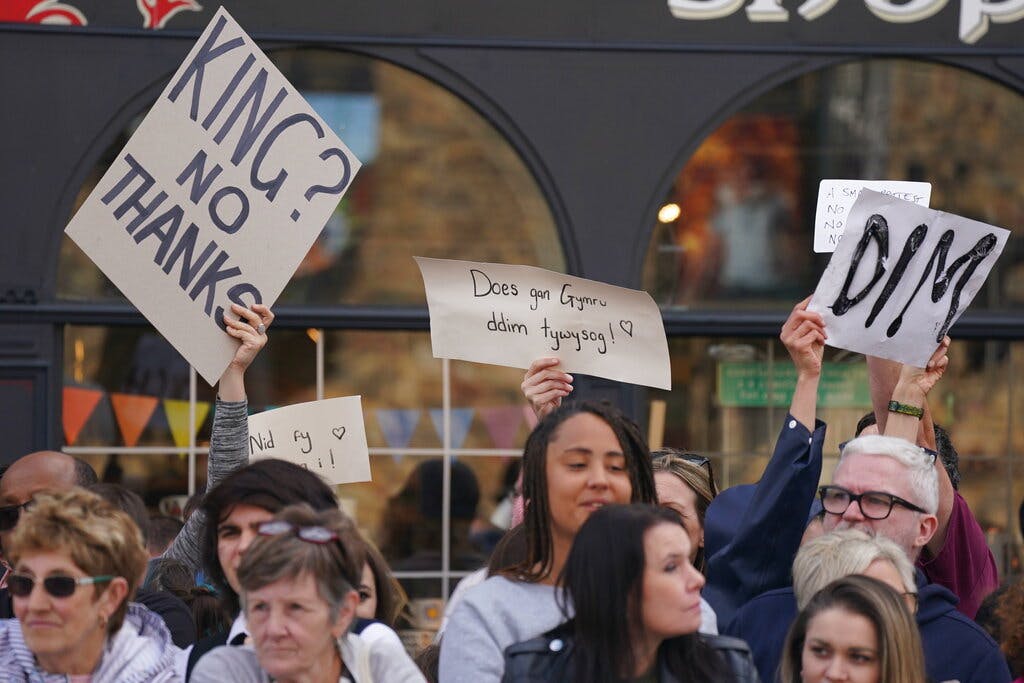Flashes of Republicanism Met With Summons by Bobbies, as Queen Is Mourned
Some fear laws set to protect public order are being misused to squelch demonstrations against the power of the monarchy.

On September 11, three days after Queen Elizabeth II’s death, a British author and teacher, Symon Hill, was starting his walk home after church in Oxford, England, when he noticed a procession had just started outside the building. Even though he considers himself a campaigner, he wasn’t planning to join a protest that day.
He stopped to listen as some of those gathered talked about Elizabeth’s death, remaining silent because he said he “would not object to people’s mourning.” Then, when someone declared Elizabeth’s son, Charles, to be “King Charles III,” he said: “Who elected him?”
Mr. Hill says he was at the back of the crowd and only two or three people heard him, but security guards soon took him away and arrested him.
He says this disturbed some in the crowd, who demanded answers from the police as to why they were arresting Mr. Hill.
“The police didn’t seem to know why they arrested me, and they kept contradicting themselves,” Mr. Hill told the Sun. “I felt alarmed to realize that I could be arrested for saying two or three sentences in the street.”
Following Elizabeth’s death, he is not alone in having been arrested for publicly demonstrating discomfort with ideas about the monarchy and Charles.
Last week, a woman holding a sign that read, “F— Imperialism, Abolish Monarchy,” was arrested outside St. Giles’s Cathedral, in Scotland, where the queen’s body lay. In a statement released by the advocacy group she works for, the woman said she was “wrongfully arrested while exercising my right to protest.”
On Monday, a video showing a protester being taken away by the police for holding a “Not My King” sign spread throughout social media. The hashtag “NotMyKing” trended on Twitter the next day.
A member of the Labour Party representing Coventry South in Parliament, Zarah Sultana, tweeted: “No-one should be arrested for just expressing republican views. Extraordinary – and shocking – that this needs saying.”
Outside England, others also have been questioning the state of democracy and freedom of speech in the United Kingdom even as Charles makes his first appearances as king of England at the 14 Commonwealth realms.
Freedom of speech is protected by common law in the U.K. Under article 10 of the Human Rights Act, “everyone has the right to freedom of expression,” but it may be subject to “formalities, conditions, restrictions or penalties as are prescribed by law and are necessary for a democratic society.”
In 1951, Britain was one of the signatories of the European Convention on Human Rights that protects the freedom of thought and expression. In 1986, legislators passed the Public Order Act that includes penalities for “threatening, abusive or insulting words or behavior that causes, or is likely to cause, another person harassment, alarm or distress.”
The chief legal counsel of a U.K.-based organization that advocates for freedom of speech, Free Speech Union, Bryn Harris, told the Sun that the laws were set to protect public order, not to control what people are saying or determine what’s acceptable or not.
“The police have been making the mistake of not asking themselves if the action is likely to disturb public order,” Mr. Harris said. “They see a sign and immediately assume it’s going to disturb public order.”
At the moment, Mr. Harris said, there is a general concern about the “misuse of public order powers.” Mr. Hill agrees, saying he believes the police are using the monarchy to justify “arbitrary policing and arrests,” and that the meaning of a free expression is threatened.
“In Britain, free expression is strongly believed in. We like to say that it is one of the countries in the world that has some of the greatest rights to free expression,” Mr. Hill said. “This not only goes against the natural human rights to free expression but to everything we know about British history.”
The Thames Valley police told British media that Mr. Hill was “arrested in connection with a disturbance that was caused during the county proclamation ceremony of King Charles III in Oxford.” The police later said that the man was “de-arrested” and that he cooperated as they “investigate a public order offense.”
Mr. Hill told the Sun that he refused to answer any questions without a lawyer present. “I am lucky,” he said while pointing out that the two people arrested in Scotland will be charged.
Mr. Hill now worries about the future of freedom of speech in the country. He voiced his desire to protest during King Charles’s coronation, which will take place in 2023, but is convinced that if this problem isn’t addressed now, the police will arrest many more people.
“Anything that has to do with the monarchy is often used as an excuse to restrict discussion,” Mr. Hill said. “It worries me that the situation has been getting worse.”

